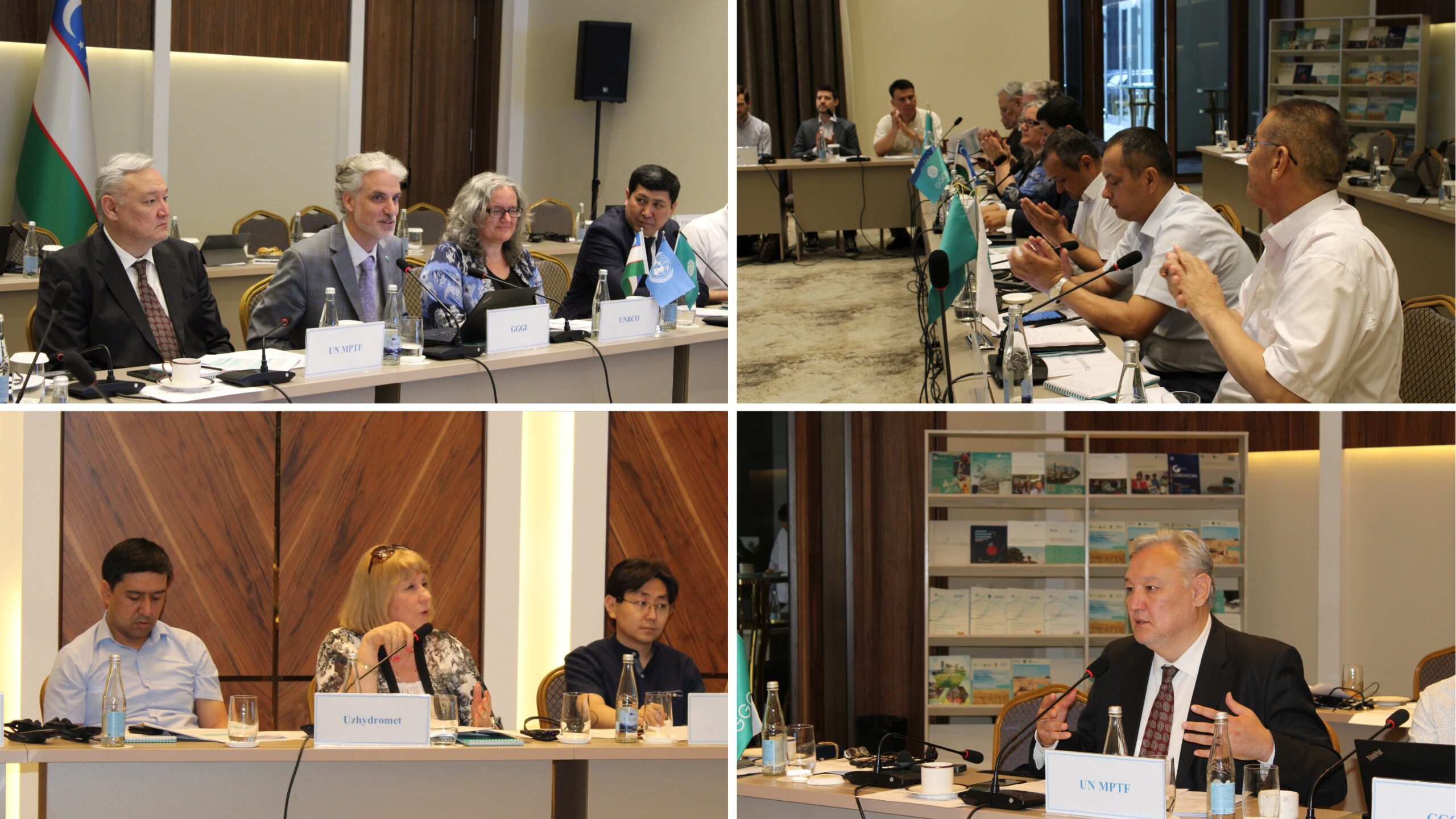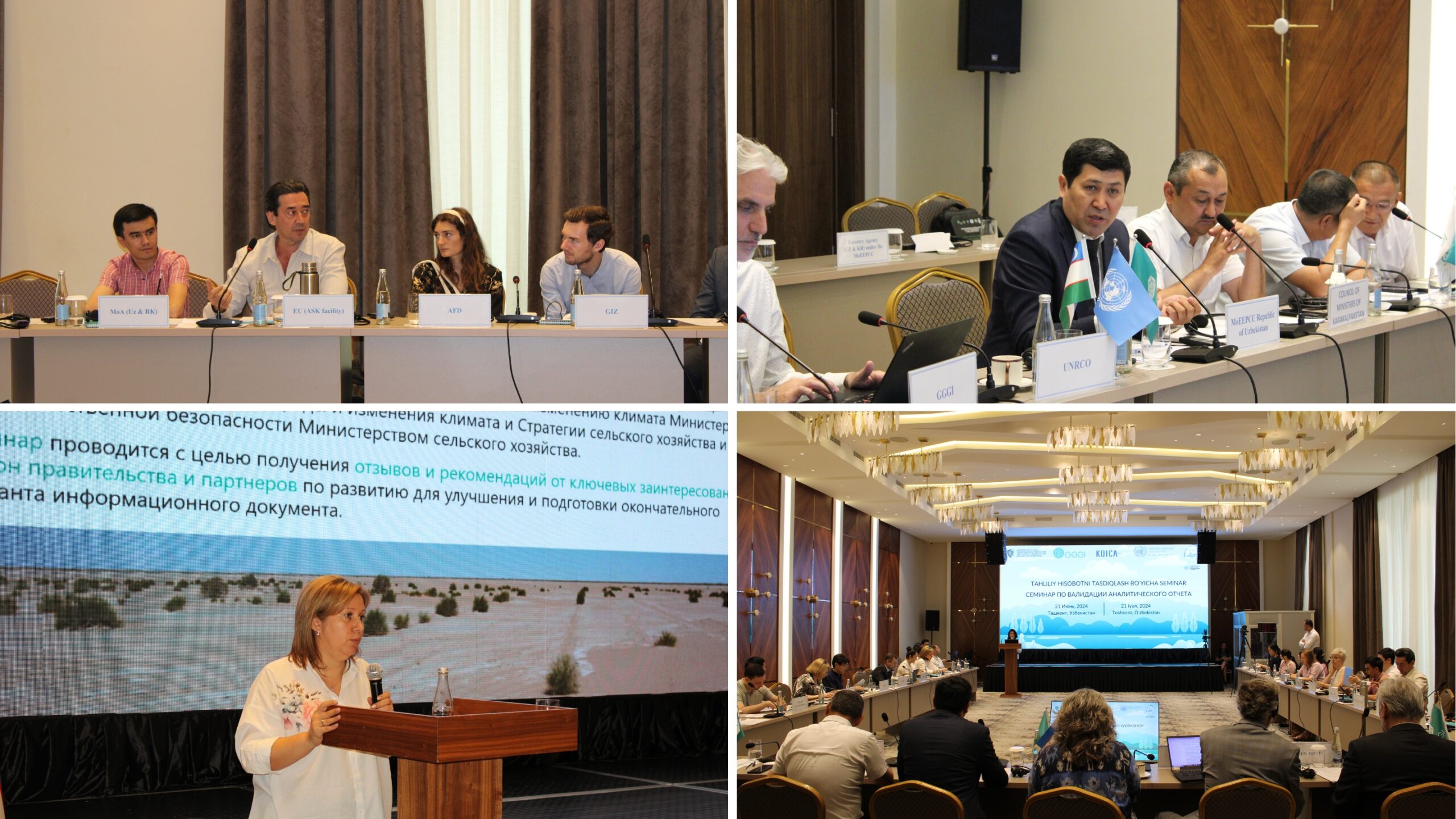Select language
Trends
Global NEWS
| Title | [GGGI] GGGI and UN MPHSTF present their White Paper on Green Policy Recommendations for Aral Sea Region in Uzbekistan |
|---|---|
|
Tashkent, Uzbekistan, June 21, 2024 – Global Green Growth Institute (GGGI) Uzbekistan and the UN Aral Sea Trust Fund (also known as the Multi-Partner Human Security Trust Fund for the Aral Sea Region in Uzbekistan [MPHSTF]) jointly developed a “White Paper on Policy recommendations on sustainable landscapes, climate-smart agriculture, and forestry development for human well-being in the Aral Sea region” (hereinafter “Whitepaper”) under the ‘Green Rehabilitation Investment Project for Karakalpakstan Republic to address impacts of the Aral Sea crisis (Aral Sea GRIP)’, funded by KOICA. On June 21, GGGI and the UN Aral Sea Trust Fund presented the findings of the Whitepaper to relevant government counterparts and international partner organizations to seek their feedback and validate the policy recommendations.
The Whitepaper consolidates the policy priorities to address climate change challenges and enhance the well-being of the people of the Aral Sea Region, as identified through respective programs implemented during 2017-2024. This initiative is being implemented within the framework of the Joint Declaration of Intent signed by GGGI Uzbekistan and the UN Resident Coordinator’s Office on 30 March 2022.
The findings and recommendations of the Whitepaper are intended to support the update of the Integrated Roadmap on Socio-Economic Rehabilitation of the Aral Sea region, the formulation of the new MPHSTF Strategy for 2024-2030, creation of policy measures under the National Climate Change Strategy that is being developed by the Ministry of Ecology, Environmental Protection and Climate Change, and the Agriculture and Food Security Strategy by the Ministry of Agriculture.
“Over its five years of operation, the United Nations Aral Sea Trust Fund has improved the resilience of communities affected by the Aral Sea disaster, benefiting nearly 300,000 people in Karakalpakstan, particularly youth, women, and the elderly in eight of the most vulnerable communities. The Fund brings together UN agencies, governments, communities, and non-governmental organizations in a collaborative effort to tackle the complex challenges faced by the Aral Sea region. Today, the collaboration between the UN Aral Sea Trust Fund and GGGI marks a milestone by jointly developing a white paper document that provides policy recommendations to help address issues affecting the well-being of the Karakalpaks,” highlighted by Sabine Mahl, Resident Coordinator of UN in Uzbekistan, in her opening remarks.
In order to introduce the invited partners to the contents of the document, Inna Rudenko, Senior Researcher for the Whitepaper development, presented the key policy recommendations proposed:
The presentation was followed by a lively discussion of the recommendations in question.
“Climate action is one of the key priorities of the government under the New Uzbekistan strategy, as climate change significantly affects food security, economic development and population’s overall well-being. The government has already committed to taking action to address the impacts of climate change. Thus, I believe this Whitepaper with policy recommendations will be a useful tool for Uzbekistan in achieving its goals,” said Salimjan Buriev, Deputy Director of Research Institute of the Environment and Nature Protection Technologies under the MEEPCC.
“It is crucial to support young farmers in Karakalpakstan who may lack experience, education, and capital needed to enable them to adopt innovative climate smart agriculture practices. Our policy recommendations integrate education and training targeting both current and future farmers and consider the unique priorities of both women and men in agriculture. By improving their knowledge of new technologies, they will improve their access to government incentives and commercial loans. These steps are vital for long-term sustainability and influencing the next generation of farmers and decision-makers,” Aaron Russell, GGGI Uzbekistan Country Representative, elaborated on the policy recommendation №5. He pointed out that one of the key targets of GGGI Uzbekistan’s Aral Sea GRIP was capacity building for farmers, women and youth, with each demographic group receiving trainings on climate change adaptation measures tailored specifically for their group.
Shukhrat Davletiyarov, Deputy Chairman of the Council of Ministers of the Republic of Karakalpakstan, added valuable insights. He emphasized the potential for more productive wastewater management and potential reclamation strategies development in the Aral Sea region by learning successful practices from other countries. Additionally, he highlighted the need for deeper regional cooperation on the topic of water use as well as further development of joint activities between GGGI and the government to enhance sustainability practices in the area.
Throughout the workshop, several insightful suggestions on the possible additions and changes were made, followed by a Q&A session between the participants and the organizers, represented by the GGGI and UNMPHSTF teams. The Whitepaper draft itself along with supporting documents were shared with the participants for further reviews and comments.
About UN Aral Sea Trust Fund: The UN Aral Sea Trust Fund (also known as the UN Multi-Partner Human Security Trust Fund for the Aral Sea Region in Uzbekistan [MPHSTF]), established under the auspices of the United Nations in late 2018, provides an integrated platform for national and international cooperation to address the ecological and socio-economic needs of the communities living in the Aral Sea region, as well as to accelerate joint efforts to achieve global Sustainable Development Goals. The Government of Uzbekistan, the European Union, the Governments of Norway, Finland, Republic of Korea, the Federal Republic of Germany, and the Alwaleed Philanthropies are the contributing partners of the Fund.
About the Aral Sea GRIP project: The desiccation of the Aral Sea basin and its delta have resulted in the loss of agricultural potential, livelihoods and employment and have led to health challenges. These problems are expected to worsen due to the impacts of climate change. To effectively address these issues, GGGI is implementing ‘Green Rehabilitation Investment Project for Karakalpakstan Republic to address impacts of the Aral Sea crisis’ (Aral Sea GRIP)’ for three years (2021 to 2024), financed by KOICA (5.9 Million USD) and supported by the Ministry of Ecology, Environmental Protection and Climate Change of the Republic of Uzbekistan (MEEPCC). The project supports communities of the four most disaster-afflicted districts of Karakalpakstan, Bozataw, Chimbay, Karauyzak and Kegeyli, with climate-smart measures to build sustainable livelihoods.
Find updates on the Aral Sea GRIP project: https://ggkp.org/aralseagrip For more information, visit: https://gggi.org |
|
| View Original URL | View Original |
| Category | etc |
| File |
|
| Sources | 녹색성장연구소 |







